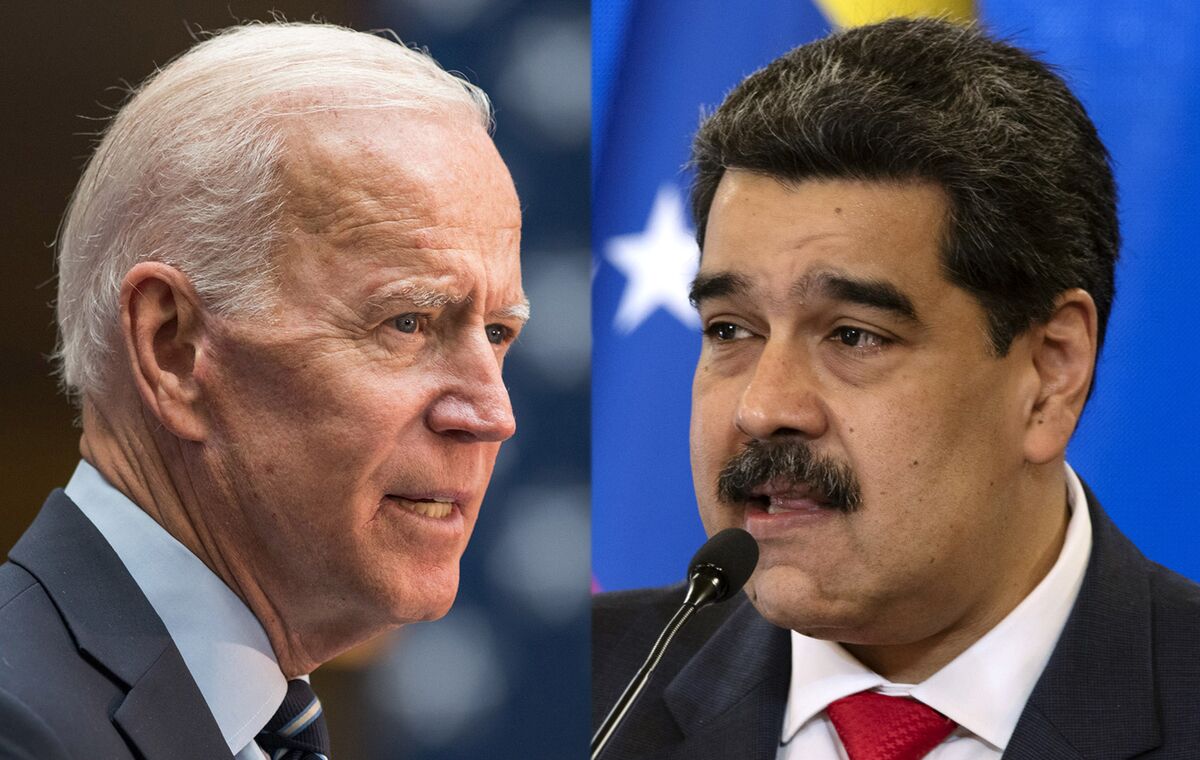

Joe Biden and Nicolas Maduro.
Photographer: Bloomberg
President-elect Joe Biden’s advisers are preparing to negotiate with Nicolas Maduro’s regime in Venezuela to try to end the worst economic and humanitarian crisis in the Western Hemisphere, according to three people familiar with the issue.
The Biden administration intends to push for free and fair elections, offering in return relief from sanctions, people said, who requested anonymity because the new team is being formed. In an exit from the Trump administration, which insisted it would only negotiate the terms of Maduro’s surrender, Biden’s advisers do not set it as a precondition and are open to direct talks.
The president-elect’s team will review existing sanctions to determine where to extend restrictions with the help of international allies and what measures could be lifted if Maduro moves toward the democratic goal, the people said. Maduro’s foreign sponsors, including Russia, China and Iran, are expected to play an important role, as is Cuba, which is willing to improve relations with the United States.
Read more: Biden Plots restores Cuba to resume Trump sanctions
Biden advisers have called the Venezuela crisis the biggest diplomatic challenge it will face in the Western Hemisphere. More than 5 million people have fled the South American country in recent years, escaping relentless economic upheavals with gang violence, power outages, widespread food shortages and government hostility. left to dissent.
Economic toll
Maduro has shown an interest in improving relationships when Biden takes office, expressing his desire for the new administration to ease the sanctions that have crushed the nation’s oil revenues. The Venezuelan economy is expected to contract by a third in 2020, according to Ecoanalitica, based in Caracas.
Nationally, Biden will fulfill his promise of temporary protection status, which would allow Venezuelans who fled to the United States to stay, people said.
A spokesman for the Biden-Harris transition declined to comment.
One of the most thorny issues for Biden is how he will address opposition leader Juan Guaido’s claim to the presidency. The United States and more than 50 countries recognized Guaido as interim leader in early 2019, when he took over the helm of the National Assembly, claiming a vacancy in the presidency because Maduro had postponed the May 2018 elections.
Despite presiding over the precipitous deterioration of the oil-rich country since the death of late President Hugo Chávez in 2013 and the efforts made over the years to force him out, Maduro continues to challenge his position. Earlier this month, his loyalists he gained control of parliament after the boycott of the opposition. Canada, Colombia, Brazil and the US were among the first to reject the results.
Opposition agenda
In theory, Guaido will lose his seat as head of the Venezuelan National Assembly on January 5. Biden takes office in Washington just two weeks later.
Since late November, the opposition leader’s team has been trying to arrange a call with Biden, unsuccessfully so far, said three people familiar with the efforts. Guaido and his allies intend to lead a dueling assembly, citing his constitutional mandate to remain in office until there are free and fair elections. Many are hidden or exiled because they face threats to their personal safety.
Guaido’s office declined to comment on the matter.
The Biden administration intends to break away from Venezuela’s opposition and what appears to be the national consensus, according to people familiar with the strategy.
This may take some time to resolve. Guaido’s popular support has waned with failed attempts to eliminate Maduro. Even some of Guaido’s allies are reluctant to support an interim presidency indefinitely. At the same time, former presidential candidate Henrique Capriles has criticized Guaido, 37, because the anti-Maduro movement lacks an effective leader, while Henri Falcon, who ran against Maduro in 2018, boast of the boycott of the opposition.
Before: Maduro increases pressure on Venezuelan human rights groups
With Guaido struggling to stay relevant in Washington, some of his advisers have raised the big goal of next year’s “mega elections” – provided the conditions are met to safeguard the process – that he would vote in a new president and parliament , as well as holding government races that are already scheduled, according to four people familiar with the discussions.
Negotiated solution
Preliminary negotiations between the Maduro regime and government opponents have often fallen against the nation’s opposition, without producing any of their demands and leading to concern about participating in future talks.
Complicating matters, Trump also warned of a “military option “, although his advisers did not accept it. In March, the State Department asked Maduro and Guaido to do so. step aside and allow a transitional government to take power to call elections. This proposal also failed to break the stalemate.
In his drive to ease sanctions, Maduro has an unlikely ally in the American business community. A group of Venezuelan creditors has been pushing for the Treasury Department to lift its restrictions on the country’s bond trade, which dropped the notes in falling value. Other executives have their eyes set on licenses that would allow them to settle on the world’s largest oil reserves.
A more immediate concern is how to facilitate the sending of humanitarian aid to deal with a rising hunger crisis. Mature tea blocked an agreement to allow the UN food agency to enter the country because it insisted on controlling distribution. The incoming U.S. government has pledged to work with multilateral organizations on humanitarian issues, but it is unclear what it will take to break the confrontation.